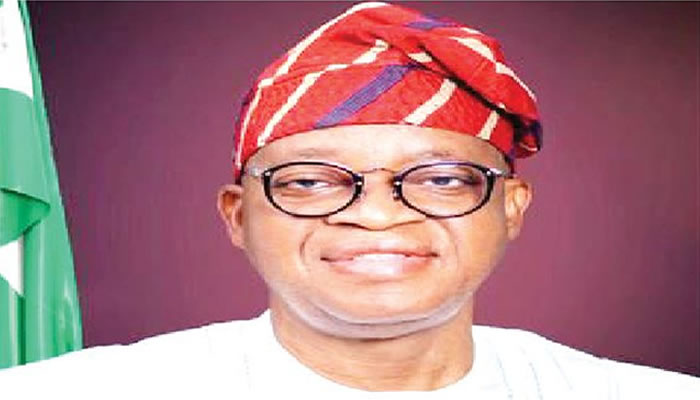Operators demand cabotage fund disbursement for maritime growth
As the pioneer Minister of Marine and Blue Economy, maritime practitioners have assessed Gboyega Oyetola’s first year in office, charging him that more dedication in the coming years would help in the realisation of the full potential of the maritime sector, ANOZIE EGOLE reports
The appointment of the former Governor of Osun State, Adegboyega Oyetola, as the Minister of Marine and Blue Economy by President Bola Tinubu on August 21, 2023, marked the beginning of a new era in the maritime sector.
Stakeholders described the new ministry as a dream come true because maritime practitioners, including licensed customs agents and master mariners, had been yearning for the creation of a separate ministry to oversee maritime affairs.
These stakeholders believed that maritime is bigger than aviation and that it contributes to the nation’s gross domestic product more than aviation does, therefore, it deserved a separate ministry like aviation.
In 2018, the Chairman, of Seaport Terminal Operators of Association of Nigeria, Vicky Hasstrup, while speaking at an interactive session organised by the Senate Committee on Marine Transport in Lagos, blamed inconsistent policies of the government for the woes of the sector. Also at the event, a Senior Advocate of Nigeria and former President of the Nigerian Bar Association, Olisa Agbokogba, called for the creation of a maritime ministry to address the problem facing the industry.
“The maritime sector is bigger than the aviation sector but does not have a ministry. If we don’t have a policy plan, nothing will happen,” Agbakoba was quoted as saying.
The pioneer Chairman of the Nigeria Shipowners Association, Isaac Jolapamo, said the Federal Government did not show any sign of seriousness to the development of the shipping industry, as evident in its policy somersault and inconsistency.
Five years later, Tinubu announced the creation of the ministry just to tackle some of the challenges affecting the sector.
Having existed for one year, operators observed that the ministry has performed well in the past year, though there is room for improvement.
In July, the Special Adviser to the President of PEBEC, Jumoke Oduwole, said the ministry did well among its contemporaries. Oduwole also announced the Nigerian Maritime Administration and Safety Agency as the best agency of government in terms of exemplary teamwork, quality service delivery, and consistency.
“We want to commend NIMASA for emerging as the best Nigerian government agency in terms of exemplary teamwork, quality service delivery, and consistency. PEBEC also wishes to commend the Minister of Marine and Blue Economy, Adegboyega Oyetola, for his commitment to ensuring that all the agencies under the Ministry improve their service delivery consistently,” she averred.
Oyetola, who recently celebrated his administration’s one year in office, stated that the ministry had raised marine revenue by 92 per cent, disclosing that two key agencies of the ministry, the Nigerian Ports Authority and the NIMASA, were responsible for the great feat.
The former Governor of Osun State revealed that the earnings of the NPA and NIMASA grew from N126bn in the first quarter of 2023 to N242bn in the first quarter of 2024.
The minister attributed the growth in revenue to the reforms initiated by the ministry and the deployment of modern technology. Since he assumed office, Oyetola noted that he had executed different projects in the maritime sector, including the monitoring boats by the NPA.
Stakeholders react
Maritime stakeholders, while lauding the creation of the ministry, also charged the minister to focus more on integrating more agencies and institutions into the ministry for greater efficiency.
In a chat with The PUNCH on Monday, the Southwest Director of the Merchant Seafarers Association of Nigeria, Ogunsakin Rotimi-Williams, maintained that within the last year, the ministry had opened the eyes of Nigerians to a part they never knew.
“He has been able to open the eyes of Nigerians to another angle that we have not looked at before now, and that is the blue economy. Before now, we were only talking about agriculture, and you find out that some institutions under marine are not even there. But with the minister, I see him like a man with a vision and a mission; he has been able to come down to the level of the people that are concerned,” he said.
Rotimi-Williams, who is also the president of the alumni of the Federal College of Teaching and Marine Technology, admitted that the minister has proven that he has all it takes to deliver.
“Even though we can’t expect him to perform magic in just one year since he assumed office. The fact that he had a listening ear assures us that there is greater light at the end of the tunnel. That assures us that he will deliver,” he stated.
Rotimi-Williams, however, advised the minister to further ensure the appointment of the right people at the right places.
“If we give him a chance to operate, let us allow him to work, people have been showing interest, let him be able to put the right people at the right places, let him put the people who know how these things work in the right places,” he advised.
The seafarers, while rating the minister 70 per cent, advised him to ensure that every parastatal under the ministry is carried along.
“He should focus more on ensuring that every parastatal that has to do with the marine and blue economy should come under the ministry. When we are talking about the blue economy, it must be incorporated into our institution so that when our students are coming out, they are already aware of the blue economy,” he said.
He advised that other agencies that were supposed to be under the ministry be moved there.
“The Federal College of Fishery and Marine Technology is still not under blue economy, and I don’t know why. We are hoping that in due time, that school will be under the ministry, so progress will take place,” he added.
The President of the Maritime Professional Forum, Oluwasegun Akanbi, called for comprehensive reforms in the maritime sector, believing the minister had started setting the legislative framework in place.
“From a seafarer’s perspective, there is an urgent need for comprehensive reform in our disorganized maritime sector. The ministry has the potential to double existing capacities and employment opportunities,” Akanbi stated.
He opined that the establishment of the ministry was a dream come true for the entire maritime community, insisting that he wasn’t personally expecting a significant impact within the first year.
Akanbi warned against setting goals for the ministry, insisting that some expectations could lead to disappointment.
“Unrealistic expectations often lead to disappointment. The establishment of the Ministry of Marine and Blue Economy was a dream come true for the entire maritime community, but I wasn’t expecting a significant impact within the first year,” he said.
Akanbi said that Oyetola’s first year in office in the ministry has focused on disentangling its functions and agencies from various parent ministries while setting up the necessary administrative framework.
This process, according to him, involves substantial restructuring in areas such as legislative amendments, management restructuring, and the creation of a new operational model.
“The minister is completely new to the terrain. We would have wished for a core maritime professional to kick start the new ministry, but Mr President sure understands his strategies, and it’s crucial to recognise the significant groundwork that has been laid despite the apparent slow pace,” he said.
He explained that the minister’s efforts had centred on extensive consultations, and his background in governance and administration had been instrumental in navigating the complex transition.
According to Akanbi, the ministry has the potential to double existing capacities and employment opportunities.
He lamented that despite all that potential, the maritime sector continued to face several challenges, leaving many questions unanswered.
He advised the minister to work on ensuring cabotage implementation as a way of addressing the influx of an illegal, unaccounted workforce.
He queried the position of the country in harnessing the potential of the fishing sector.
“What is holding back the disbursement of Cabotage Vessel Financing Funds? Where are we on maritime education and addressing license limitations? What are the plans for improving sea transportation,” Akanbi queried.
He also recommended an urgent need for other ports in the country to be developed in a bid to decongest Lagos Ports.
He warned that there is so much work to be done, urging the minister to step up the pace.
“We have so much work at hand, yet the pace is not commensurate with the urgency. The ministry’s recent achievement of a 92 per cent increase in revenue across its agencies is a promising indicator of progress.
“With the right policies and further sector-specific expertise, the ministry could become a pivotal force in transforming Nigeria’s blue economy,” he said.
A clearing agent, Mr Chimezie Kingsley, held that the one year of the minister’s tenure has seen the acquisition of some equipment, like tugboats by the NPA, saying that would help boost operations at the ports.
“As far as I am concerned, the minister has done well in the last year. We all know the ministry is new,” he said.
Also, the Tincan Island Chapter Chairman of the National Council of Managing Directors of Licensed Customs Agents, Mr Abayomi Duyile, lauded the minister for clearing the traffic gridlock that had previously crippled activities along the Apapa-Oshodi Expressway.
“I will commend the minister for clearing the access roads to the ports; I will say that is one of the things he has achieved in the last year by clearing the access road. At least for once, we have free access, and that has reduced the cost of logistics in doing business along that axis,” Duyile stated.
Similarly, a member of the National Association of Master Mariners, Adewale Ishola, stated that the minister started well by engaging stakeholders when he newly assumed office.
The ship captain lauded the minister for adding the Nigerian Institute for Oceanography and Marine Research to the ministry, asking him to do more.
“And I also want to add to his credit that he added other relevance to the ministry. I can mention one, which is the addition of the Nigerian Institute for Oceanography and Marine Research, which was formerly under the Ministry of Agriculture. It’s a plus for him because that agency is very relevant to the Marine and Blue Economy Ministry.
“He needs to go out and do more. He has started well, and we will encourage him to do more by reaching out to the key stakeholders,” he charged.







